- Home
- Anne Mather
Rachel Trevellyan Page 12
Rachel Trevellyan Read online
Page 12
‘I shall need some powerful stimulant to encourage me to leave,’ remarked Malcolm unpleasantly. ‘I didn’t come all this way just to spend a few weeks in the sun.’
‘Then what did you come for?’ Rachel stared at him with tormented eyes.
‘You’ll learn one day. Now, go and tell Eduardo I want to see him.’
‘Eduardo?’ Rachel was astonished. ‘What do you want to see Eduardo for?’ She glanced round. ‘If you want to get up, I can help you as I’m here.’
‘Don’t ask questions. Just get him!’
Malcolm’s mouth was hard, and Rachel got obediently to her feet. The whole situation appalled her, and she wished there was some way she could back out of it. She didn’t want to stay here. She wanted nothing from the Martinez family, and in spite of Malcolm’s aggressive attitude she didn’t see how he could force his will on them. Perhaps she was being unnecessarily pessimistic. Perhaps they would leave in a week’s time as Luis wanted. Certainly, as far as she was concerned, it was the only solution.
CHAPTER EIGHT
THE following morning Malcolm surprised Rachel by asking her to arrange for the car to be put at their disposal.
‘You’re going out?’ she exclaimed.
‘We are going out,’ corrected Malcolm suavely. ‘I thought it was time we saw something of the countryside.’
Rachel hesitated. What did this mean? Was Malcolm about to accept Luis’s ultimatum and leave in a week as expected? Oh, she hoped it was true!
The car that was made available to them was a pale blue convertible, with chrome slashes along the sides. It was a beautiful vehicle and ideal for such a climate. Their chauffeur was Eduardo, and Rachel paused to wonder whether that was why Malcolm had wanted to speak to him the day before. She shook her head. Perhaps she was too quick to seek for ulterior motives when it came to dealing with her husband, but past experience had made her unnaturally cautious.
Apart from the day she had walked to the village, it was the first time they had left the quinta since their arrival, and in spite of her misgivings, Rachel found herself relaxing as the beautiful building and its incumbent problems disappeared from sight. She sat in the back with Malcolm and tried not to speculate on why he should be looking so pleased with himself.
They drove through the valley, past groves of citrus and olive trees, acres of crops where black-clad peasant women worked, impervious to the heat, it seemed. Rachel wondered how they could bear to wear so many clothes. Even the young women wore scarves over their heads. Occasionally, a hand would be raised in acknowledgement of the car. Obviously all the Marquês’s vehicles were instantly recognisable; but when it was seen that the Marquês was not with them they merely received curious stares.
The road wound inland through the hills and presently dropped into another valley. They came upon a village, like Mendao, with a few cottages and a store, and a church surrounded by a graveyard. Rachel would have liked Malcolm to stop, but he shook off her restraining hand and said: ‘We don’t have time.’
Rachel stared at him. ‘Time? I should have thought we had all the time in the world.’
‘Well, we haven’t. Drive on, Eduardo. Is it much further?’
Eduardo glanced behind him at his passengers. ‘Nao, senhor. Mas, nao gosto. Espero que o Senhor Marquês——’
‘What the hell are you muttering about, man?’ Malcolm silenced him angrily. ‘If you have anything to say, say it in English!’
Rachel frowned, trying to translate what Eduardo had said. Nao meant no, she knew, and she thought he had said that he didn’t like it. But what? What didn’t he like? And why had he mentioned Luis’s name in that worried way?
She looked helplessly at her husband, but he ignored her and she looked out at the passing scenery with a rising sense of anxiety. Where were they going? Where had Malcolm instructed Eduardo to take them that was worrying the young Portuguese so much?
They turned off the main road on to a side track, passing through an open gateway before following the drive of a house and presently coming to a halt before double panelled doors which stood wide to the air.
Rachel took one look at Malcolm’s smug face and then looked back at the building. It was a country house, smaller than the Quinta Martinez, and lacking its charm and beauty. Nevertheless, it was quite an attractive building in mellowed stone, tall chimneys rising above a sloping roof.
‘Where are we?’ she asked uneasily. ‘Eduardo! What is this?’
‘Esta Alcorado, senhora!’
‘Alcorado!’ Rachel pressed her hands to her cheeks. ‘The—the home of Senhorita Alejento?’
‘Sim, senhora.’
‘Oh!’ Rachel was horrified. She turned on Malcolm. ‘What are you thinking of? Why have we come here?’ She looked desperately at Eduardo. ‘Drive on, Eduardo. Don’t wait. Take us back to the quinta at once!’
‘Don’t you dare!’ Malcolm was so incensed he flung himself forward in his seat and caught Eduardo by the throat. ‘Get my chair out of the boot, and be quick about it!’
Eduardo stumbled out of the car and went to get the chair. It was obvious that Malcolm terrified him and Rachel could expect no help from him. But she refused to be a party to this horrible fiasco.
‘Have you taken leave of your senses, Malcolm?’ she cried. ‘Why have you come here? You can’t mean to ask to see the Marquesa!’
‘Can’t I? Why not? If the mountain won’t come to Mahomet ...’
‘Malcolm, can’t you see this is crazy! People don’t do things like this!’
‘Shut up. You know nothing about it. This is between Joanna and me.’
‘Then why have you brought me along? Why am I to be dragged into it?’
‘What would you have had me do? Leave you at the quinta to hold hands with the Marquês? No, thanks!’
Rachel’s cheeks burned. ‘You can’t be serious! Why, only yesterday——’
‘Eduardo! Where the hell are you, man? Get me out of this car!’
The sound of their raised voices had carried on the still humid air. A black-clad manservant appeared in the doorway at the head of the flight of steps leading up to the entrance, and was looking down on them with unconcealed hostility. But then he seemed to recognise the car, and he came hastening down the steps towards them.
‘Bom dia, senhor, senhora!’ he greeted them politely. ‘Posso ajuda-lo?’
Malcolm nodded. ‘Yes, you can tell the Marquesa de Mendao that she has a visitor!’
‘O Marquesa, senhor?’ The man looked concerned. Then he added in English: ‘The Marquesa is expecting you, senhor?’
Eduardo had brought round Malcolm’s folding chair and was helping him into it. He looked up rather nervously at his counterpart and the other man repeated: ‘The Marquesa is expecting you, senhor?’
Malcolm looked up from his position in the chair. ‘No—no, she’s not expecting me. It’s to be a—surprise.’ He smiled, but it did not reach his eyes. ‘Will you help Eduardo up the steps with my chair?’
The manservant hesitated, looking at Rachel still in the back of the car. ‘And—the senhora, senhor?’
‘My wife is feeling a little tired,’ said Malcolm, in reply. ‘She’ll—follow us later. Won’t you, Rachel?’
Rachel did not reply. She couldn’t. Her heart was pounding so loudly she felt sure it was audible, and she felt physically sick when she thought of what Malcolm was about to do.
Somewhat against his better judgement, the Alejentos’ manservant helped Eduardo up the steps with Malcolm’s wheelchair. He was obviously perplexed, in two minds as to whether this was someone he should or should not admit. But Malcolm’s attitude was such that he didn’t really have much choice in the matter.
Rachel remained where she was. She didn’t know what to do. The idea of accompanying Malcolm into the Alejento house did not bear thinking about, but similarly, how could she remain sitting here?
At the top of the steps, Malcolm indicated that Eduardo should take charge of th
e wheelchair and the manservant led the way into the hall.
Silence fell once more broken only by the birds and the hum of bees among the flowers which grew beside the drive. A somnolent peace descended, but to Rachel it seemed a transitory state. She sat there in the back of the convertible waiting for something to happen, but she didn’t know what she expected.
And then the sound of another automobile came to her ears as it accelerated up the drive towards her. It was a red sports car with a young man at the wheel, and beside him sat Amalia Alejento.
Rachel wanted to curl up and die. What would the other girl think when she saw her there? What possible explanation could she give for her presence?
The sports car came to a halt and the young man sprang out looking curiously towards Rachel. As Amalia climbed out too, he said something to her in an undertone and she responded briefly before walking across to the convertible.
‘Bom dia, Senhora Trevellyan,’ she said. ‘This is a—surprise!’
Rachel managed a faint smile. ‘Yes, isn’t it?’
Amalia glanced round as the young man came to join her. ‘Allow me to present you to my brother, senhora,’ she went on. ‘Jorge, this is Senhora Trevellyan!’
Jorge Alejento took Rachel’s hand courteously and raised it almost to his lips. ‘Muito prazer, senhora. I am most pleased to make your acquaintance.’
Rachel forced another polite smile, conscious of the admiration in the young man’s eyes. She thought he must be about her own age, with sleek dark hair that was cut shorter than Luis’s and the same generously-covered bones of his sister.
Amalia’s eyes suddenly grew speculative. ‘You are here with—the Senhor Marquês, senhora?’ she questioned sharply.
Rachel shook her head. ‘My—my husband wished to see the Marquesa, senhorita,’ she replied, wishing they would leave her and go on into the building.
Amalia’s eyes narrowed now. ‘I see. And—the Marquês?’
‘As far as I know, he’s at the quinta, senhorita.’
Amalia nodded, and then looked curiously at her, as though trying to understand why Rachel should not have entered the house with her husband. But fortunately, she decided, or so Rachel assumed, that to ask such a question would be an impertinence unsuited to her station, and with a shrug she gave Rachel a rather patronising smile before beginning to mount the steps.
Half way up she turned, and seeing that her brother was still by the car, said peremptorily: ‘Come, Jorge!’
But Jorge Alejento was not so easily controlled. ‘You go ahead, Amalia,’ he replied lazily, thrusting his hands into his pockets. ‘I will stay and keep the senhora company for a while.’
‘That’s not necessary——’ began Rachel quickly, but he raised a finger to his lips in a conspiratorial gesture and she halted.
Amalia clicked her tongue, disappearing into the house with obvious reluctance. Clearly she did not like her brother taking an interest in someone whom she regarded with such contempt.
Jorge rested his arms on the top of the car door. ‘I have heard about you, senhora,’ he said, with a lazy smile. ‘You are married to this man who has come to stay in Dona Joanna’s house, sim?’
Rachel moved uncomfortably. ‘That’s right, senhor.’
He nodded slowly. ‘This man is confined to a wheelchair, is he not?’
Rachel moved her head in assent. ‘As you say.’
‘And he has come here to see Dona Joanna?’ Jorge frowned.
‘Why don’t you go inside and find out for yourself?’ Rachel’s nerves were stretched and she had no patience with curious youths who thought to entertain themselves by baiting her.
Jorge raised dark eyebrows. ‘You think I am being inordinately inquisitive?’ He straightened. ‘I’m sorry, that was not my intention. It merely stunned me that someone like you should be married to a man old enough to be your father.’
Rachel looked desperately towards the entrance of the house. How much longer was Malcolm going to be?
‘Why don’t you come inside too?’ Jorge was speaking again, and Rachel turned to him irritably.
‘I don’t wish to enter your home. We were not invited here, and I have no intention of intruding upon your parents’ privacy!’
Jorge considered this. ‘And your husband, this Senhor Trevellyan. He is intruding?’
‘Oh, please. Go away and leave me alone!’
Rachel thrust open the door of the car and stepped out, unable to sit still any longer. It had been bad enough before, but now she was beginning to feel like some peculiar specimen on display. She gave Jorge Alejento a pointed stare and he stepped out of her path, allowing her to cross the forecourt with jerky steps. Oh, why didn’t Malcolm come? What was he doing? What was he saying?
‘I’m sorry if I’ve annoyed you, senhora.’ That was Jorge again. He had followed her and was standing right behind her.
Rachel swung round. ‘What do you want of me?’ she demanded. ‘Why are you doing this? What possible joy can you get from talking to me?’
‘Joy, senhora? I am afraid I do not understand.’
Rachel made an impatient gesture. ‘It means pleasure—satisfaction. What satisfaction does it give you to pester me?’
‘Pester, senhora?’ Jorge tugged at his ear-lobe. ‘I’m afraid you’ve lost me again.’
Unwillingly a smile came to Rachel’s lips. It was ridiculous, after all, the whole situation was ridiculous!
She sighed again and looked at the young man more tolerantly. ‘How old are you, Jorge?’
Jorge looked taken aback at her casual use of his name. ‘Mim! I am how do you say—twenty and three, vinte e tres, senhora.’
‘I thought so.’ Rachel looked him up and down. ‘Go away and find someone else to play with!’
Jorge looked hurt. ‘I am not a child, senhora.’
‘Then stop acting like one. You don’t really want to talk to me. You just thought it would be rather an amusing game to stay here and embarrass me with your questions. Well, you don’t embarrass me, Jorge, you just annoy me!’
Jorge’s face suffused with colour. ‘Then I apologise.’
Rachel wrapped her arms about her slim body. ‘That’s all right.’
‘But in any case, you are wrong.’
Rachel turned. ‘Why?’
‘I admit, my initial intention was to amuse myself for a while. But you interest me. I find your attitude refreshing. I am enjoying talking with you.’
‘I don’t somehow think your family would approve,’ remarked Rachel dryly.
‘I am not a child. I am permitted opinions of my own. I was educated in England, and I have talked with English girls before. They are usually more interesting to talk to than Portuguese girls. Here our women are not so emancipated. They confine their conversations to their home and their families. Before they are thirty they are middle-aged and boring!’
Rachel gasped, ‘What an indictment!’
‘Nevertheless, you will find I am right—except in very special cases. Take my sister Amalia, for example; she has no interests outside the home. She knows how to control servants, run a home efficiently. And no doubt when the time comes that she and Luis have children, she will make a satisfactory mother. But what does she know of the world, of life outside her own narrow little existence? Nada! Nothing! She is totally opposed to having to think for herself, to having a career. Can you wonder that an intelligent man finds such a person boring?’
Rachel tried not to be interested, but it was difficult. ‘And a man like—like the Marquês: what does he do in such circumstances?’
‘If he’s bored, you mean?’ Jorge frowned.
Rachel made an awkward gesture. ‘I suppose so.’
‘He finds something—or someone else—to take his interest. Of course, there are some men who find their work a more than adequate substitute for the dissatisfaction of their personal lives.’
Rachel scuffed her sandal against the gravel of the forecourt. ‘I think you’re only g
uessing,’ she said. ‘You don’t really know whether you are right. Besides, some men prefer a woman to be wholly subservient to them, to look after their needs and care for their children. To listen when they have something to say. They gain an egotistical satisfaction from being domineering. And in any case, how do you know that Portuguese men are not different from Englishmen in their separate needs? I mean—in England women are reasonably emancipated, I agree, and their husbands appreciate this. It’s been a natural progression over the years. But in Portugal women have remained the same for hundreds of years, so perhaps their husbands don’t want their wives to become individuals.’
‘Men are men, the world over!’ exclaimed Jorge forcefully. ‘And all men prefer a woman who can entertain their minds as well as their bodies. Just think of Scheherazade!’
Rachel smiled. ‘I think that this conversation has gone far enough, Jorge,’ she began smilingly, when there was a sudden shout from the doorway of the house behind them.
‘Senhora! Senhora! Venha depressa!’
Although Rachel wasn’t sure what he meant, the urgency in Eduardo’s tones was clear enough. Taking a startled look at Jorge, she started across the forecourt, running towards the steps. Jorge ran beside her and when she stumbled he was there to prevent her from falling.
‘Oh, thank you,’ she gasped, and took the steps two at a time. Then to Eduardo: ‘What is it? What’s wrong?’
Eduardo let out a stream of incoherent Portuguese that completely confused her. Her knowledge of the language was as yet so slight, and it was obvious in his overwrought state he was unable to speak the few words of English he knew.
But Jorge was there, and Jorge understood Eduardo perfectly. ‘He says it is your husband, senhora,’ he translated. ‘He has been—taken ill.’
Rachel’s cheeks paled. ‘What—where?’
Eduardo twisted his hands anxiously. ‘Venha comigo, senhora. For aqui!’
Jorge put his hand beneath Rachel’s elbow and urged her forward. She hardly noticed the panelled hall, or the bowl of mauve, trumpet-shaped flowers that gave off such a delicate perfume. She was conscious only of a sick, frightened feeling in the pit of her stomach, and the nervous anticipation of not knowing what to expect.

 A Forbidden Temptation
A Forbidden Temptation Dark Castle
Dark Castle Hell Or High Water
Hell Or High Water Jake Howard's Wife
Jake Howard's Wife Come Running
Come Running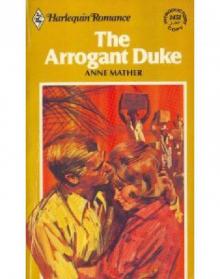 The Arrogant Duke
The Arrogant Duke Sweet Revenge
Sweet Revenge Passionate Protectors?
Passionate Protectors? Savage Awakening
Savage Awakening Come the Vintage
Come the Vintage An All-Consuming Passion
An All-Consuming Passion A Fever In The Blood
A Fever In The Blood The Shrouded Web
The Shrouded Web A Haunting Compulsion
A Haunting Compulsion Duelling Fire
Duelling Fire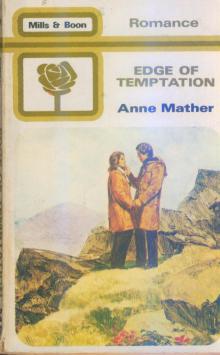 Edge of Temptation
Edge of Temptation Wild Enchantress
Wild Enchantress The Brazilian Millionaire's Love-Child
The Brazilian Millionaire's Love-Child Captive Destiny
Captive Destiny The Pregnancy Affair
The Pregnancy Affair The Sanchez Tradition
The Sanchez Tradition A Passionate Affair
A Passionate Affair Sinful Truths
Sinful Truths Stay Through the Night
Stay Through the Night Seen by Candlelight
Seen by Candlelight No Gentle Possession
No Gentle Possession His Forbidden Passion
His Forbidden Passion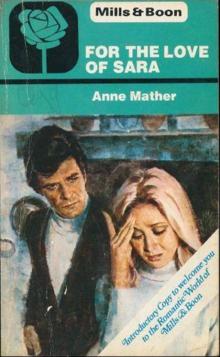 For the Love of Sara
For the Love of Sara A Trial Marriage
A Trial Marriage Melting Fire
Melting Fire All The Fire
All The Fire Bedded For the Italian's Pleasure
Bedded For the Italian's Pleasure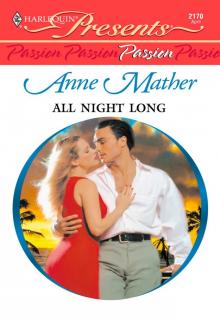 All Night Long
All Night Long The Japanese Screen
The Japanese Screen Rich as Sin
Rich as Sin Smokescreen
Smokescreen Dangerous Rhapsody
Dangerous Rhapsody Brittle Bondage
Brittle Bondage A Savage Beauty
A Savage Beauty Castles of Sand
Castles of Sand A Distant Sound of Thunder
A Distant Sound of Thunder THE VIRGIN'S SEDUCTION
THE VIRGIN'S SEDUCTION White Rose of Winter
White Rose of Winter Proud Harvest
Proud Harvest The Legend of Lexandros
The Legend of Lexandros Country of the Falcon
Country of the Falcon Diamond Fire
Diamond Fire Stormspell
Stormspell Legacy of the Past
Legacy of the Past Such Sweet Poison/Blind Passion
Such Sweet Poison/Blind Passion The Baby Gambit
The Baby Gambit The Smouldering Flame
The Smouldering Flame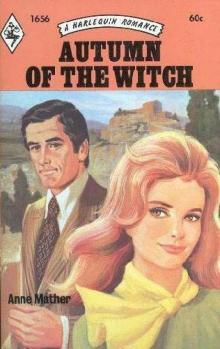 Autumn of the Witch
Autumn of the Witch Rachel Trevellyan
Rachel Trevellyan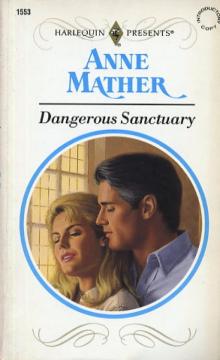 Dangerous Sanctuary
Dangerous Sanctuary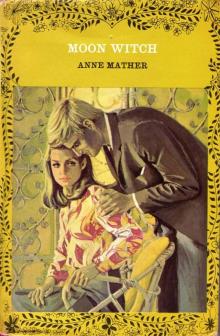 Moon Witch
Moon Witch An Heir Made in the Marriage Bed
An Heir Made in the Marriage Bed Images Of Love
Images Of Love Innocent Obsession
Innocent Obsession Tidewater Seduction
Tidewater Seduction Pacific Heat
Pacific Heat Take What You Want
Take What You Want The Spaniard's Seduction
The Spaniard's Seduction The High Valley
The High Valley A Woman of Passion
A Woman of Passion The Reluctant Governess
The Reluctant Governess Charade in Winter
Charade in Winter Mendez’s Mistress
Mendez’s Mistress Dark Moonless Night
Dark Moonless Night The Greek Tycoon's Pregnant Wife
The Greek Tycoon's Pregnant Wife The Autumn of the Witch
The Autumn of the Witch Night Heat
Night Heat Morelli's Mistress (Harlequin Presents)
Morelli's Mistress (Harlequin Presents) Jack Riordan's Baby
Jack Riordan's Baby Beware the Beast
Beware the Beast Born Out of Love
Born Out of Love Greek Affairs in his Bed: Sleeping with a StrangerBlackmailed into the Greek Tycoon’s BedBedded by the Greek Billionaire
Greek Affairs in his Bed: Sleeping with a StrangerBlackmailed into the Greek Tycoon’s BedBedded by the Greek Billionaire Green Lightning
Green Lightning Guilty
Guilty Snowfire
Snowfire Moondrift
Moondrift Stolen Summer
Stolen Summer Such Sweet Poison
Such Sweet Poison Dark Venetian
Dark Venetian Innocent Sins
Innocent Sins Baby Out of the Blue
Baby Out of the Blue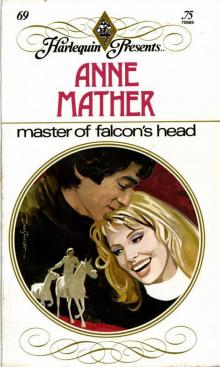 Master of Falcon's Head
Master of Falcon's Head Rooted in Dishonour
Rooted in Dishonour A Secret Rebellion
A Secret Rebellion The Forbidden Mistress
The Forbidden Mistress Dangerous Enchantment
Dangerous Enchantment The Judas Trap
The Judas Trap Burning Inheritance
Burning Inheritance Forbidden Flame
Forbidden Flame Who Rides the Tiger
Who Rides the Tiger Impetuous Masquerade
Impetuous Masquerade Fallen Angel
Fallen Angel Act of Possession
Act of Possession Dangerous Temptation
Dangerous Temptation Pale Dawn Dark Sunset
Pale Dawn Dark Sunset Dark Enemy
Dark Enemy Innocent Virgin, Wild Surrender
Innocent Virgin, Wild Surrender Follow Thy Desire
Follow Thy Desire Sandstorm
Sandstorm Apollo's Seed
Apollo's Seed Whisper Of Darkness
Whisper Of Darkness A Wild Surrender
A Wild Surrender A Dangerous Taste of Passion
A Dangerous Taste of Passion The Night Of The Bulls
The Night Of The Bulls Hot Pursuit
Hot Pursuit The Longest Pleasure
The Longest Pleasure An Elusive Desire
An Elusive Desire Storm In A Rain Barrel
Storm In A Rain Barrel